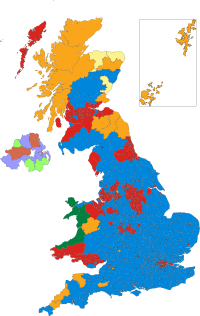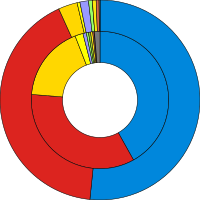
Back যুক্তরাজ্যের সাধারণ নির্বাচন, ১৯৯২ Bengali/Bangla Eleccions al Parlament del Regne Unit de 1992 Catalan Etholiad cyffredinol y Deyrnas Unedig, 1992 CY Parlamentsvalget i Storbritannien 1992 Danish Britische Unterhauswahl 1992 German Elecciones generales del Reino Unido de 1992 Spanish Yhdistyneen kuningaskunnan parlamenttivaalit 1992 Finnish Élections générales britanniques de 1992 French הבחירות הכלליות בבריטניה 1992 HE Elezioni generali nel Regno Unito del 1992 Italian
| |||||||||||||||||||||||||||||||||||||||||||||||||
All 651 seats in the House of Commons 326 seats needed for a majority | |||||||||||||||||||||||||||||||||||||||||||||||||
|---|---|---|---|---|---|---|---|---|---|---|---|---|---|---|---|---|---|---|---|---|---|---|---|---|---|---|---|---|---|---|---|---|---|---|---|---|---|---|---|---|---|---|---|---|---|---|---|---|---|
| Opinion polls | |||||||||||||||||||||||||||||||||||||||||||||||||
| Turnout | 77.7% ( | ||||||||||||||||||||||||||||||||||||||||||||||||
| |||||||||||||||||||||||||||||||||||||||||||||||||
 Colours denote the winning party, as shown in the main table of results | |||||||||||||||||||||||||||||||||||||||||||||||||
 Composition of the House of Commons after the election | |||||||||||||||||||||||||||||||||||||||||||||||||
| |||||||||||||||||||||||||||||||||||||||||||||||||

The 1992 United Kingdom general election was held on Thursday 9 April 1992, to elect 651 members to the House of Commons. The governing Conservative Party led by Prime Minister John Major won a fourth consecutive election victory, with a majority of 21. This would be the last time that the Conservatives would win an overall majority at a general election until 2015 and the last general election to be held on a day which did not coincide with any local elections until 2017. This election result took many by surprise, as opinion polling leading up to the election day had shown a narrow but consistent lead for the Labour Party under leader Neil Kinnock during a period of recession and declining living standards.[1]
John Major had won the leadership election in November 1990 following the resignation of Margaret Thatcher. During his first term leading up to the 1992 election he oversaw the British involvement in the Gulf War, introduced legislation to replace the unpopular Community Charge with Council Tax, and signed the Maastricht Treaty. Britain was sliding into its second recession in a decade at the time of Major's appointment.
Opinion polls in the run-up to the election had suggested that it would end in a hung parliament or a narrow Labour majority. The fact that it produced a Conservative majority meant that it was one of the most dramatic and memorable elections in the UK since the end of the Second World War.[2] The Conservative Party received what remains the largest number of votes at a United Kingdom general election in British history, breaking the previous record set by the Labour Party in 1951.[3]
Former Conservative leader and Prime Minister Margaret Thatcher, former Labour Party leader Michael Foot, former SDP leader David Owen, three former Chancellors of the Exchequer, Denis Healey, Geoffrey Howe and Nigel Lawson, former Home Secretary Merlyn Rees, Francis Maude, Norman Tebbit, Rosie Barnes, Sinn Féin leader Gerry Adams and Speaker of the House of Commons Bernard Weatherill left the House of Commons after this election, though Maude and Adams returned at the next election. Future Conservative leader Iain Duncan Smith was elected to parliament in this election.
Cite error: There are <ref group=lower-alpha> tags or {{efn}} templates on this page, but the references will not show without a {{reflist|group=lower-alpha}} template or {{notelist}} template (see the help page).
- ^ Brown, Faye (19 February 2024). "Neil Kinnock: Labour leader who lost 'unlosable' election predicts Starmer will end up in No 10". Sky News. Retrieved 5 July 2024.
- ^ "1992: Tories win again against odds". BBC News. 5 April 2005. Archived from the original on 22 April 2009. Retrieved 22 October 2013.
- ^ "Election Statistics: UK 1918–2017". House of Commons Library. 23 April 2017. p. 12. Archived from the original on 14 August 2017. Retrieved 14 August 2017.


